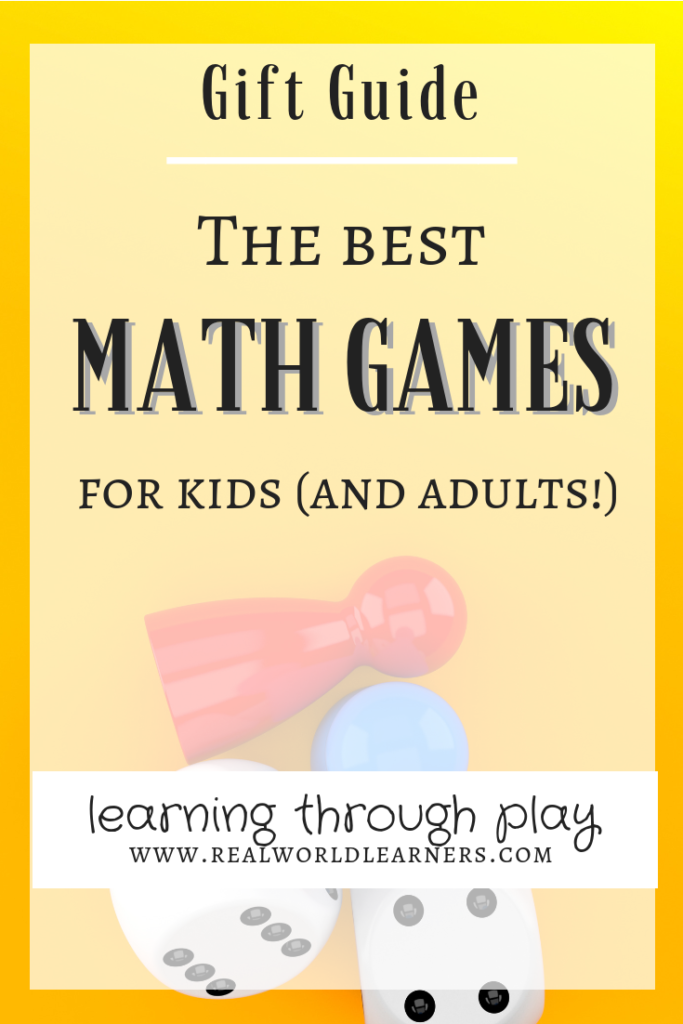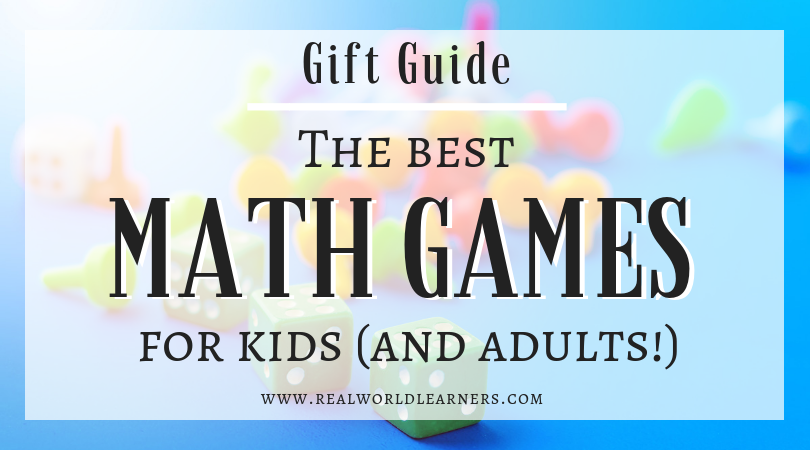Best Math Games for Kids (and Adults!)
I am a strong advocate of real-world learning and am constantly on the lookout for ways to replace textbook learning with hands-on activities in real life that are relevant and interesting to kids.
But in addition to all the learning that can happen in real life, many skills can also be learned and reinforced through games.

This post contains affiliate links. See my full disclosure policy here for more information.
If you are looking for ways to replace worksheets with games that will help your children and students develop a love for learning and confidence in themselves as learners, you may find some great additions to your game collection in this curated list of the best Math games for kids (and adults!).
I’ve compiled this list of unique, educational, and fun math games for kids (and adults!) of all ages. These can be used in Math centers, after-school math clubs, homeschooling, or even (especially!) family game nights.
Zingo: Number Bingo 1-2-3
This game is perfect for young learners who are beginning to recognize numbers, count, and add. Kids will develop number sense while playing a fun, brightly-colored, fast-paced Bingo game.
Math Dice Jr.
This game is travel-friendly and simple to learn and play, but involves some complex mathematical reasoning. It can be as simple or easy as you want, making it a great game for a large span of ages. Using addition or subtraction, combine as many of the regular dice as possible to equal the number rolled on the large dice.

 I Sea 10!
I Sea 10!
This game is a good way to practice combinations of 10. Once kids know all the combinations that add to 10 and can instantly recognize combinations to 10, they will have a strong foundation in math. You can read more about the benefits of using ten frames to help kids understand math conceptually and intuitively here.
Clumsy Thief
This is a fun game that teaches kids about money, adding to 100, and using strategy. Thief and jail cards add complexity to the game and ensure a lively game for multiple ages.
 Sums in Space
Sums in Space
Many games are designed to help kids practice basic math facts, but this game has a some unique factors that make it stand out above the others. This game can be played competitively or cooperatively and helps students practice adding and subtracting, learn the difference between even and odd numbers, and compare numbers. Certain numbers on a dice roll initiate new game play situations that keep the game interesting.


 Mobi – the Numerical Tile Game in a Whale Pouch
Mobi – the Numerical Tile Game in a Whale Pouch
This game is similar to Bananagrams; use the tiles to make math equations as quickly as possible and connect them crossword-puzzle style.
 Sleeping Queens
Sleeping Queens
This card game teaches kids to recognize combinations to 100 (by 10’s). Several different combinations of cards (Knights, dragons, potions, etc.) add variety and challenge to this fun, fast-paced game. This one is a favorite at our house!
Math War – Multiplication
If you’re looking for a quick, simple, and affordable card game to replace a set of flashcards, this game will make a great addition to your Math centers.
 Melon Rind Check the Fridge
Melon Rind Check the Fridge
This card games involves collecting combinations of cards that add to 25. Players will trade cards to help make full sets, but somebody might be bluffing!
 Prime Climb
Prime Climb
The unique color coding in this game helps kids intuitively learn to multiply and divide. This color-coded system in itself is a genius way to learn Math, and setting these skills in a game makes it a winner for both math centers and family game nights!
Edupress Math Noodlers Game, Gr. 2-3
This game has a lot going on! Kids will solve math problems by choosing a “write it,” “draw it,” “show it,” or “choose it” cards – this element takes the game a notch above most math games since it provides multiple ways to approach problem solving and helps students develop a strong understanding of how math works. Concepts covered include addition, subtraction, multiplication, division, fractions, decimals, measurement, graphing, money and time. (There is also a grade 4-5 version.)
Sumoku
This game involves only number tiles and a dice but it comes with several play variations, some of which make it a very complex game! As players arrange the tiles in a Scrabble(TM)-like format, they will be doing a lot of addition and multiplication while avoiding placing the same color tiles in any given row or column.
Pet Me
This game would work very well for introducing or practicing multiplication and division skills. Students will use tokens to feed their hungry pets, dividing up the food equally between each animal. They will move around the game board, adopting pets and feeding them, multiplying and dividing as they go.
Money Bags Coin Value Game
This game provides a fun context for counting money. Kids race to the finish line counting money, exchanging equal values of coins, and earning money as they go. The game includes challenges such as creating certain amounts of money using specific types of coins, and comes with plenty of play money and colorful game pieces.
 Buy It Right Shopping Game
Buy It Right Shopping Game

This is another money game where kids learn the value of money through counting and adding money and making correct change. The board provides plenty of real-world scenarios for setting prices and buying and selling items.
 Lakeshore Allowance Game
Lakeshore Allowance Game
In this fast-paced game, kids will earn an allowance for certain jobs, then save or spend it on things they choose.
PayDay
This is a more advanced money game that will help kids learn about buying property, taking out loans, paying interest, and working all of that within a payday cycle.
Battleship with Planes Strategy Board Game
This Amazon exclusive game takes the classic Battleship game up a notch. Practice coordinate graphing skills and strategy at the same time as you plot and plan ways to take down your opponent’s ships and planes.
Winning Moves Games: Game of the States – Can you sell the most from State to State
This games combines Geography (a map of the U.S.A. with fact cards about each) and Math; race across the map buying and selling products along the way.
Qwixx: A fast family dice game
This dice game involves a lot of strategy and complex thinking! This would be a great game to play with the whole family, since older kids and adults could enjoy it alongside younger kids. Math skills include addition, basic probability, and critical thinking.
You may also be interested in:
- 10 Math Storybooks for Kids: Help your child develop a love for learning with 10 beautifully illustrated stories about Math
- 10 Tips for making Math fun for Kids
- Use manipulatives in Math to help kids develop number sense
- Geoboard Geometry: A Geoboard lapbook unit
- Math Monday: Ten frame math with seashells
- Math Monday: Cotton Ball Algebra
Math Curriculum Recommendation
Are you looking for a Math curriculum that is built around hands-on activities designed to make Math fun for kids and help your children or students discover the Why behind Math?
We use, love, and highly recommend RightStart Mathematics! You can read more about our experience with the RightStart Math curriculum here:
… or check out their site directly here (by clicking on the image below):
Note: If you’re in Seattle, make sure to check out the Math ‘N Stuff store for a huge collection of Math and Science games, books, and activities, as well as a large selection of Legos!
What else would you add to this list of the best Math games for kids (and adults)? Let me know in the comments below!







 Sleeping Queens
Sleeping Queens
 Melon Rind Check the Fridge
Melon Rind Check the Fridge




 Buy It Right Shopping Game
Buy It Right Shopping Game Lakeshore Allowance Game
Lakeshore Allowance Game





2 comments on “Best Math games to help kids enjoy learning – a gift guide”